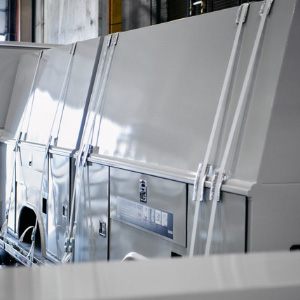Outfitting your company’s service trucks with cranes will increase the capabilities of your workforce — and may even be a business necessity in many cases. However, choosing the right crane type is essential. You’ll need to consider factors such as lift and reach capacity, duty cycle and, of course, cost. For most companies, the decision boils down to picking between an electric or hydraulic truck crane to mount on their fleet of service vehicles. Each type has specific advantages and disadvantages.
Electric Truck Cranes
Electric canes offer a low-cost, entry-level option for light-duty or short-cycle lifting applications. They make the most sense if you only need to lift objects weighing under 6,000 pounds once or twice a week. Besides their affordability, one of the biggest benefits of electric cranes is that you can operate them while the truck isn’t running, which saves fuel and minimizes vehicle wear. They also don’t require you to install additional hydraulic components such as pumps or reservoirs.
On the downside, the limited lift capacity of electric cranes means they won’t provide the power required for heavy-duty applications. And if you have to start using the crane more frequently, it will significantly shorten the life cycle of the machine — the electric motors aren’t built to withstand the rigors of constant use. The limited power also results in a slower lifting process, which can dramatically reduce your productivity and make it more difficult to keep your projects on schedule.
Hydraulic Truck Cranes
If your company has the business capital on hand, hydraulic cranes deserve careful consideration. They provide the additional lifting power needed for elevating objects weighing 6,000 pounds or more — some models can even accommodate loads up to 14,000 pounds. They’re also the better choice if you need to lift for extended periods, as they’re more capable of handling continuous duty cycles. And the hydraulics enable greater control of the crane for increased operating efficiency.
However, the higher cost of hydraulic truck cranes may make them unaffordable for some businesses — especially smaller companies with limited financial resources. You will also need to install the hydraulic components and power take-off devices on your vehicles, which can require extensive and potentially costly retrofitting.
What’s more, your trucks’ engines must idle during operation, which will require more frequent refueling and create additional wear and tear. Expect your fleet maintenace costs to increase accordingly.
Reading Truck Body Can Help You Weigh the Pros and Cons
At Reading Truck Body, we have the experience and expertise to help you explore both sides of the electric vs. hydraulic crane body dilemma. We’ve been providing custom service bodies for companies in industries such as telecommunications, oil and gas, utilities, HVAC and landscaping for more than 60 years. All our truck bodies also come with comprehensive warranties for your protection and peace of mind.
Feel free to touch base with a Reading Truck Body distributor near you to learn more about your electric and hydraulic truck crane options. You can also contact us online for additional information.



